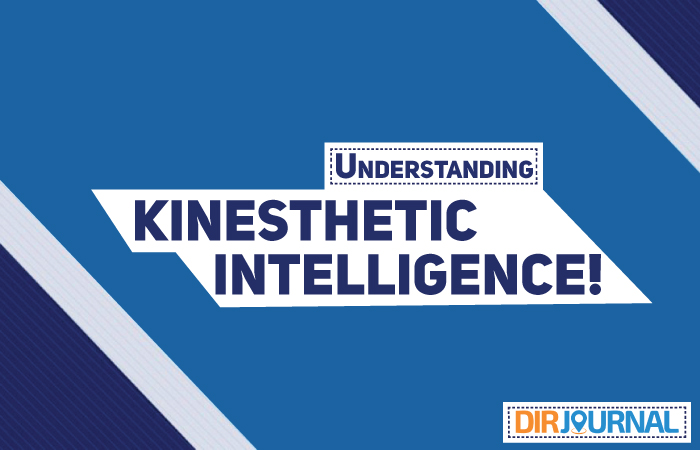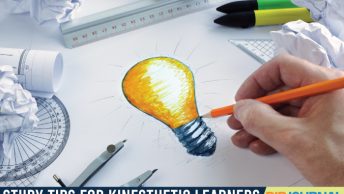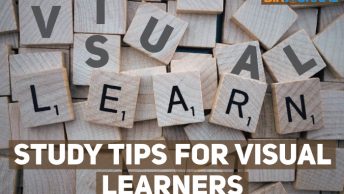Kinesthesia is our movement sense. It simply refers to an awareness of changes in momentum, balance, pressure and body position in general. It tells us all about how we are moving our bodies. Kinesthetic intelligence includes control of the bodily motions, the ability to handle objects skillfully and the gift for using whole body motions.
You would have seen or you could be one of those people, who are always on the move; who study while walking, whose body is forever active irrespective of what they are doing, even while watching TV. For the kinesthetic types, moving is fundamental and they often fidget if nothing else. It helps them concentrate better.
This “body smart” group as they are called affectionately includes overly active people who indulge in physical self and for whom learning is a physical experience.
Kinesthetic Intelligence And Our Brain
The area of kinesthetic intelligence is located in the cerebellum and concerns the thalamus, main ganglions and others parts of the brain. The brain’s motor cortex controls bodily motion and people with this intelligence display dexterity and skills for fine motor movement.
Identifying Kinesthetic Intelligence
It is very easy to identify people with kinesthetic intelligence. They enjoy and usually are seen to be successful in active sports, constructing, dancing, hands-on tasks, working with scientific probes and microscopes, robotics, digital still and video cameras etc. These activities involve deftness and physical coordination and using their fine and gross motor skills, people with kinesthetic intelligence involve in learning and expressing themselves through various physical activities.
Kinesthetic Behavior
People with kinesthetic intelligence behave differently to those that completely follow the norms set by society. These people love figuring out how things work and do not need others to tell them. They do things going by their instincts and get “gut feelings” for things around them. They have plenty of physical energy and love physical movement. They cannot stay still for long and are often described as being “on the go.” Children squirm at the breakfast table or even at their desk at school. They enjoy dance, sports and any exhilarating experience. They are very good at creating things and they are always active and love outdoors. Their motor skills are excellent and they are very aware of their bodies. They learn well through movement and “doing” and prefer touching than looking.
We keep hearing things like, “My mind works better when I’m doing something physical, like running or walking.” “I like spending all my free time outdoors.” “I enjoy working with my hands.” All these constitute kinesthetic intelligence.
Creativity
This sort of high kinesthetic intelligence is what creates scientists, writers, artists, musicians, dancers, performers and other creative people that allow their minds and hands to move without any pre-planned format. While some are blessed with athletic abilities, others are gifted in fine-motor skills, such as drawing and crafts.
Many creative writers use free writing style to get ideas and musical composers end up playing impromptu pieces. These are examples of allowing the body to take over and play a leading role in coming up with new ideas. These actions are not pre-planned and it is just the body movement preceding the thought processes.
A person with kinesthetic intelligence is said to write beautifully and can make writing feel real, funny, down to earth and physical. If this intelligence is strong in a piece of writing, then it is likely to affect the reader at the gut level. This writing may also have a natural sense of movement, the kind of writing that people may say, “breathes.”
Reaction Of Society
Society is almost startled with what it perceives as hyperactivity, being called “intelligence.” Kinesthetic-intelligence is one of the basic human intelligences that has not been appreciated in our culture and has always been suppressed by civilizations. It is the negative social conditioning that causes people to suppress the bodily kinesthetic intelligence.
Albert Einstein once stated that he felt it in his muscles, when he was thinking about something that later proved to be very significant. This heightened kinesthetic sense tells us that helping develop this kinesthetic sensitivity from an early age, instead of suppressing it, will help people turning out to be more creative individuals.
Discouragement
Children grow up as conditioned by the society. Without realizing what it is, most people, including parents and teachers, restrict children from doing a lot of things just because that is not the way they are supposed to be done. In school the superior student is always the one that is great at copying the sequences of movements in writing, dancing, in sports, in speech and even social manners. These things teach a student to pay attention to something that is being taught and then do them accordingly. Whereas, the kinesthetically creative person lets the body lead and moves independently without following any preconceived plan. These free combinations may produce excellence in many areas. Who knows there could be a highly creative individual hidden in your child too. But it takes an intelligent adult to recognize and understand kinesthetic activities.
Some people may say that this is like putting the cart ahead of the horse. An example of the Volkswagen is given when comparing a kinesthetic person. In Volkswagen, the motor is at the back of the vehicle and this is German innovation. Similarly, in the creation of intelligent and creative individuals, children should be allowed to innovate without having to follow a planned course.
How To Encourage Kinesthetic Intelligence?
Rather than ridicule children with kinesthetic intelligence and who are very fidgety, it is better to give them tools and equipment to manipulate in class. Rather than stopping them from moving, it is better to let their bodies develop through expression, enabling them to grow up into creative individuals.
They need opportunities to learn by acting things out or moving, as they are “hands-on” learners. Expecting them to sit quiet for long and listen to something without experiencing it physically is unrealistic.
People with kinesthetic intelligence can be excellent with fine-motor or gross-motor skills, or even both. People like surgeons, athletes, dancers are highly valued, either for their skills, their talent or things they produce. Kinesthetic intelligence needs to be understood better to be able to provide better opportunities to such people, in order to bring out their hidden talents.














Very interesting points!
It is said that letting kinesthetic children explore themselves increases their self-esteem as adults. Parents and teachers should be educated about this.
Wish I had known all this when my son was younger.
Very interesting points!
It is said that letting kinesthetic children explore themselves increases their self-esteem as adults. Parents and teachers should be educated about this.
Wish I had known all this when my son was younger.
This is a very interesting article with some very useful tips. I am going through the changes of my son being hyper versus a kinesthetic learner. This has given me HOPE. thanks.
This is a very interesting article with some very useful tips. I am going through the changes of my son being hyper versus a kinesthetic learner. This has given me HOPE. thanks.
Dear Hassan
This has been an insightful article for me. I am trying to understand myself as a kinesthetic person and how I can improve myself . Thank you for writing and sharing this knowledge. If you have any other information about kinesthetic learning do forward me at my email.
Zakii from Singapore
Dear Hassan
This has been an insightful article for me. I am trying to understand myself as a kinesthetic person and how I can improve myself . Thank you for writing and sharing this knowledge. If you have any other information about kinesthetic learning do forward me at my email.
Zakii from Singapore
This article is a God-send for me as my 7 yr old son will not be returning to his Montessori school in September as they are not able to ‘handle’ him. He is very energetic and moves around a lot. After an assessment report, I looked into matters further and recognised ALL of his behavioral traits in the descriptions of a Kinesthetic Learner. I am now relieved to know what i am working with and excited about organising a tailor-made learning environment for him. Any ideas on a home-schooling package that fits Kinesthetic kids, please let me know.
So want to get it right to facilitate my little ‘Einstein’ 🙂
This article is a God-send for me as my 7 yr old son will not be returning to his Montessori school in September as they are not able to ‘handle’ him. He is very energetic and moves around a lot. After an assessment report, I looked into matters further and recognised ALL of his behavioral traits in the descriptions of a Kinesthetic Learner. I am now relieved to know what i am working with and excited about organising a tailor-made learning environment for him. Any ideas on a home-schooling package that fits Kinesthetic kids, please let me know.
So want to get it right to facilitate my little ‘Einstein’ 🙂
my child has been recognized as a kinesthetic learner, she is in first grade but reading on second grade level and she is very hands on, the teacher at school keeps on pulling the “yellow light” almost every day and is getting me really frustrated because I know what she is able to learn, she is not behind at all but still because she won’t sit all day long she is being “labeled”. I wonder if i could find a school that is familiar with kinesthetic children…….
my child has been recognized as a kinesthetic learner, she is in first grade but reading on second grade level and she is very hands on, the teacher at school keeps on pulling the “yellow light” almost every day and is getting me really frustrated because I know what she is able to learn, she is not behind at all but still because she won’t sit all day long she is being “labeled”. I wonder if i could find a school that is familiar with kinesthetic children…….
hey nikki bro
Sara M. I too am seeking (and actually thinking of setting up my own!) Kinesthetic Learning Centre. My son, 8yrs, is currently at home with me while I am working on building a full Kinesthetic learning programme for him. His last school was a Montessori School, which is considered one of the best learning environments for our hands on children. They 'released' him, stating that they did not have sufficient resources to teach him. My thought now is that it is the actual teacher/school approach that has to match with our very gifted children. They must understand and MAKE provision to incorporate manipulative learning tools in the classroom. I agree with Wordweave. The teachers and other parents need to be educated about this, as 'damage' is being caused to the many Kinesthetic learners who are being labeled and removed because they pose too much of a challenge to the 'traditional' structures.
Wow!! after reading so many article about kinesthetic learner, i'm sure that i'm one of the kinesthetic learner… now i am 15 years old..
I've always thought that I was a visual learner until I took many quizzes that identified me as a kines. learner. I have been able to sit down for a long period of time until this year (grade 12 second semester-18 years old) and I find it just so odd for a random change and discovery. However I do a lot creative and athletic things, wow. Thanks for the article!
Thank you! I am a kinesthetic learner… been a workaholic, working 6 days (7 days if my family lets me!) and going to the theatre is a waste of money because I always go use the bathroom or just walk around. I work-out and run 3 miles daily. Everytime I get an idea, my muscles get excited and I fidgit and have to draw it out. Turns out my daughter is the same way! and she doesn’t have to wait 30 years to find out!
Is it good if the people are kinesthetics
Most kinesthetic info is about children and learning. However I work with a man that fits kinesthetic attributes to a “T.” I am trying to understand him better because he drives me (and the other co-workers nearby) absolutely crazy. He is highly intelligent without a question. However his people skills are almost nil. His work is sometimes unbelievably great, sometimes unbelievably sloppy. He drums, hums, marches, and whistles non-stop all day long (with the occasional belch). People are asking to move several cubicles away to get away from the incessant noise coming from his cube. In fact, management has placed him in a cubicle way in the corner as far from as many people as possible. He lives on cloud 9 where nothing real ever happens, and is always surprised when something “bad” happens (such as a robbery, for ex). My co-worker calls him “naive.” He has been told to quieten down, but it never lasts. I do appreciate this man’s fine qualities, and he has many. However, his blanket cluelessness has driven most of our team crazy. Well, nothing will change I am sure, but it felt good to vent about it for a moment. I wish someone would educate people on a) how to live & work with (ie, appreciate & accept, process & respond to) kinesthetic personality types like his; b) kinesthetic people on how to be more sociable and drive the people around them a little bit less crazy.
I am a kinesthetic learner. I came to realize this when I began college. My very first course for my aa in business. It was called peak performance success in college and beyond. I learned that there were 3 primary or dominant learning types, visual, auditory and kinesthetic. I knew right off the bat which 1 I was. Ever since I was a teen I was able to juggle pretty much non stop and hold a conversation at the same time. It really took me no focus, it was easy, and without any practice. I can do a willy on a bicycle like 25 feet or more first try and yet I don’t even ride them anymore and when I did I never really did a willy it’s just that when I try I am naturally successful at it. I used to jump off roofs when I was a kid. I am 25 now and I have pretty much lost desire to do things like work out but I still run some times. Just because you are kinesthetic does not mean you have physical energy. Yes I COULD run 25 miles right now without any pre-training or walk all day until night fall into the very next morning without taking a single stop to rest. I have even stood in place all night until morning then just went walking but I can also like right now feel very lazy and tired. I know the reason why though. If I want to not be weary in physical activity I must weigh out a lot of bad habits first like watching too much tv or listening to too much music or playing video games that keeps me sitting. Once I am free from these to stand and be me, I can feel myself a great deal more and live in my movements and enjoy my activity of simply walking and seeing and hearing. As a kinesthetic person I find that it is most helpful when trying to start a beginning as a new day with many past mistakes that I always want to start with my body first. I must be comfortable physically first, not stiff, but flexible, to then open my mind to exploring my full potential free to anything. Yet sadly if I am not first at ease with my body then I simply do not esteem other worthy necessities.
omg, wish my teachers had known about this when i was growing up,,,,,,,,i never sat still,infact my school report was more predictable than the weather in manchester,,every year ——-would do better if he listened more ,paid attetion!! hated school,,,,,except for art wood/metal work, craft work,all sports, was on all the teams ,martial arts good and excellent in most,,im not religous but was put in for an ‘o’level RE,,,?? anyway i am so glad ive come across this ,,explains a lot im no different now at 40+ infact my back ground engineering construction, at work and spare time, also 2 inventions on the go one very close to market,,,,,,,,,its a common joke when i say im not goin out at the wk end my friends ask what am i making or building now??? to me i dont think i do that much,,,,im not bad at working things out like puzzels gadget puzzels ive solved easy,,hate reading listenin cant sleep when ive thought of a new idea or im working something out if its still on my mind by the time ive gone to bed,thats it may as well stay up,,,,im going to find out some more on this as would like to learn a language and found when working in germany i picked it up fairly easy,but reading and listening may be a problem i do listen but i forget so easy,,,,,,,
Thanks a lot. Really helped me with my students.
I was looking for information on adult kinisthetics. I am 36 years old. I started studing dancing and acting when I was an adult. I excell at these things and performance. However, there is a lot of literature saying kinisethic learners must move and fidget in order to learn things. I don’t have that. I never fidgeted in school. I can sit still for hours and study, though I do pay attention to my body and stretch or walk when I need to . The part about being kinisthetic and having to fidget or necesarily move in order to learn bothers me. I feel I excell around movement, but besides dance I am not really a hands on person and as a child actually at all costs stayed away from hands on things classes such as shop and art, preferring to read. As an adult, the ONLY hands on activity I perhaps show some skill in would be computers. Besides this I haven’t had too much drive or desire to study any type of hands on field, so I don’t know if I would excell at them or not. Though, I love to write in my spare time, my spelling has never been that good. That is what microsoft word is for or a spell check on websites such as these.
I’am 27 years old and just found out today that I am a Kinisthetics learner.. WOW.. this really does explain a lot about me. I thought I was just odd, not normal. As a child learning was a very hard for me. Once in collage I realised that learning to music helped me a lot while doing pretty much everything. A day with out it, like today working in IT with no headphones, I am very lost, cant think. Restless. Bored. This really has helped me. Thank you!
I finally, have been told this learning disorder, only in the past year.
My only intentions, is to why my early learning schooling, and later college years, that no one could properly diagnose my condition. It was said, that I only was anti-social, not a good listener, and have a
very military like personality.
I would like to understand this much further, and only to realize that nothing was wrong with me, only that my learning style was different, and this came upon me only in my adult years.
Thank You!
[…] body in motion and rest—and these additional resources alter the working of mind. As noted here (and […]
I need help with this.
Am I kinesthetic?
This has been a joy to read; I found our recently I’m kinesthetic – yes I talk with my hands and friends say they can read me like a book. If I’m feeling a certain way it shows A MILE OFF!!
I wanted to be a dancer, unfortunately I never found the right dancing school… I’m now in my mid thirties; and in the wrong career… Oops
Hello everyone,
I am 36 years old and just discovered that Im a kinesthetic-visual-auditive person. ( by a dawna markova research) it described me so well that i was shocked!!
I nevera had a problem in school cause somehow by myself dicovered that Needed to stufy by myself making diagrams and list and writting on my mirror as it were a blackboard and I was teaching someone while walking around in my beedroom. I had the highest gpa during business school.
The problem started when I started working…since having studied administration ( not really liked it but didn’t know what else to study), started to get bored at my job after one year….changed to another department and lasted a couple of more years…then started switching companies and right now I’ve worked in about 6 different companies…
In my new job Im starting to feel the same way and I also thought I had something wrong because everyone seems so happy having worked for the same company and same job for more than 20 years and I can’t get passed my second year!!! Then found this document by markova and found out that and administrative job is not for me…but right now Im confused about what should I’ve be working in to really enjoy it….
Great article 🙂